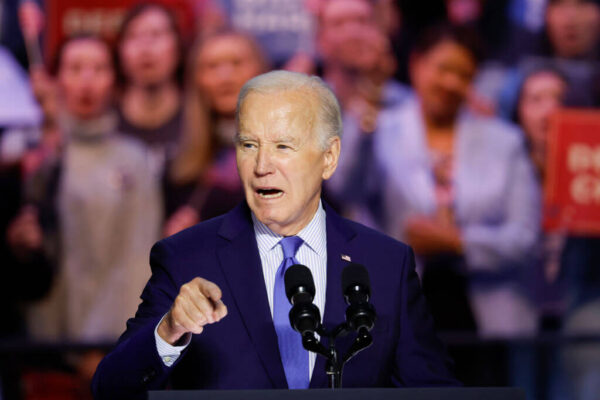President Joe Biden scored a landslide victory in South Carolina’s Democratic primary Saturday, with the incumbent collecting 96 percent of the vote, although turnout was low among Black voters.
The decisive win in the first state to vote in the new Democratic primary calendar comes as the incumbent seeks to reestablish himself with Black voters who have seemingly grown apathetic since helping put Biden over the top during the 2020 election.
Since then, Biden has faced increasing criticism from progressives who claimed the incumbent was losing considerable support among Black voters because he had not taken any meaningful action on reparations since taking office more than three years ago.

In Saturday’s vote, the 81-year-old Biden faced two Democratic rivals, including author and candidate Marianne Williamson — who previously expressed support for up to $500 billion in reparations — and Rep. Dean Phillips of Minnesota, who in January floated the idea of putting Republican billionaires Elon Musk and Bill Ackman in his cabinet if he won the presidency.
However, both Williamson and Phillips posed little if any threat to Biden as they combined for less than 4 percent of the vote, while the race was called for the incumbent only 23 minutes after polls closed.
Seemingly, Biden’s dominant victory put to rest any doubts about who the Democratic nominee would be despite recent scrutiny surrounding Biden’s ability to unite the party and as many Democrats called for a younger candidate in 2024.
The primary was the first since the Democratic National Committee changed the primary calendar, removing Iowa and New Hampshire as the initial states to vote and placing South Carolina in the starting position.
While South Carolina may not be decisive in the general election, its substantial Black population represents a key constituency that has now set the mold in influencing the Democratic nomination.
The vote was closely watched for any signs that Biden’s stance with Black voters had weakened, which would have spelled major trouble for his reelection.
“Black voters in South Carolina mirror trends among black voters nationally. So, what happens here could be an indicator of what’s to come,” Todd Shaw, a University of South Carolina political science professor, told the BBC last week.
Despite the overwhelming victory, low turnout was a concern for Biden as only 4 percent of Democratic voters, or a total of 131,870 people, showed up to the polls statewide.
The number amounted to only about 24 percent of the turnout in 2020, as Saturday’s vote marked the lowest turnout in the last three Democratic presidential primaries.
By comparison, voter turnout in the state was roughly 16 percent in 2020 and 12.6 percent in 2016.
The lowest voter numbers were tallied in Greenville County, with 2.91 percent; Spartanburg County, with just 2.4 percent and Anderson County, with 1.99 percent.
Belle Meade in Gantt was the only precinct in Greenville County to exceed 10 percent turnout for registered voters.
During the 2020 election, Black voters in the state played a vital role in boosting Biden. However, Saturday’s repeat victory is not a clear indicator of broader enthusiasm for Biden’s potential reelection.
South Carolina voters have traditionally shown a weak appetite for the presidential primary, especially in majority Black districts throughout the state, as demonstrated by a flurry of rural counties that reported turnout of about 2-to-3 percent on Saturday.
Democratic officials said Black voters were still standing with Biden as Saturday’s early voting results showed 76 percent of primary voters were Black, which amounted to a 13 percent increase from 2020, according to Jay Parmley, executive director of the South Carolina Democratic Party.
That’s compared to 56 percent in 2020.
“I think the narrative nationally is ambivalence among Black voters. We have not seen that here. There no evidence of it,” Parmley said.
Ahead of the vote, some polls showed voters turning sour on Biden’s policies, with the president’s lead slipping with people under the age of 30 and among Hispanic voters, while 22 percent of Black voters said they planned to support the Republican nominee in the next election.
Previously, the 2022 midterm election highlighted trouble on the horizon for Democrats as turnout among Black voters was identified as one of the party’s most notable weaknesses going into 2024.
Black voters have, in recent years, witnessed a shift, particularly among Black men, who are increasingly placing trust in the GOP to address concerns related to the ability to build generational wealth, while a growing number of Black Americans harbor a growing sense of disappointment with Democrats, which had fallen short of addressing persistent issues affecting the Black community.
In recent weeks, Biden has worked to call attention to policies that have benefited the nation’s Black citizens.
While the administration has worked to advance racial equity by investing in disadvantaged communities across the country, including major federal investments in Black-owned businesses, Biden has taken no tangible action that would move the needle on reparations.
South Carolina Rep. Jim Clyburn said the low voter turnout was not a major concern, although he acknowledged previously that Biden needed to re-engage with Black voters, leading to the president’s January speech at Mother Emanuel African Methodist Episcopal Church in Charleston, S.C., where nine Black parishioners were gunned down by a white supremacist in 2015.
“You’re the reason I’m president,” Biden told a mostly Black crowd. “You’re the reason Donald Trump is a loser, and you’re the reason we’re gonna win and beat him again.”
In the speech, Biden sought to draw a contrast between his message on racial justice and those of Republican presidential candidates, including Nikki Haley, who refused to cite slavery as a cause of the Civil War at a December town hall in New Hampshire.
He also warned against Trump’s “flirtation with white supremacy” as a grave threat to democracy, a message he reiterated in his victory speech on Saturday.
“The stakes in this election could not be higher,” Biden said while warning of “extreme and dangerous voices at work in the country — led by Donald Trump.”
On Saturday, Clyburn sought to highlight Biden’s strong support in Orangeburg County, which is 60 percent Black and has two historically Black universities, where turnout was 11.3 percent — the second-highest in the state.
In the precincts of Orangeburg, where the majority of residents are Black, both the voter turnout and Biden’s winning percentage were even higher.
“That demonstrates to me what I have been saying all the time, that Joe Biden has not lost any support among African Americans,” Clyburn said on CNN’s “State of the Union” on Sunday. “Now, you can go out and talk to 10 people, publish the comments of one, and maybe give off a different thought. But he has not lost support among African-Americans.”
The next Democratic primary is set for Tuesday in Nevada, where Biden will test his message with Latino voters.


